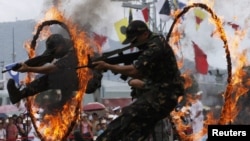China has announced another double-digit increase in defense spending, amid regional worries about its growing military assertiveness.
Premier Li Keqiang said the defense budget will be raised by 12.2 percent this year to help modernize China's armed forces and develop more high-tech weapons.
"This year, keeping in mind the [Communist] Party's goal of strengthening the armed forces under new circumstances, we will comprehensively enhance the revolutionary nature of the Chinese armed forces, further modernize them and upgrade their performance, and continue to raise their deterrence and combat capabilities in the information age," said Li.
The announcement immediately drew a statement of concern from Japan, which is among many Asian countries alarmed at China's rapidly growing military.
China announced the figures along with a wide range of other policy plans at an annual meeting of its ceremonial National People's Congress.
In a different part of his speech to parliament, Li said China is targeting "around a 7.5 percent" growth rate in 2014, which is unchanged from last year's goal.
In recent years, China has faced a slowdown following three decades of rapid growth that saw it become the world's second largest economy, behind only the U.S.
Beijing has also faced rising discontent among its citizens over rampant government corruption, worsening pollution, and its heavy-handed policies on ethnic minorities.
In a possible sign of those frustrations, security forces hauled away an unknown number of pamphlet-distributing protesters in Tiananmen Square as the parliament opened.
Security forces quickly picked up the pamphlets and ordered those nearby to delete pictures from their cameras, leaving it unclear what the protesters were advocating.
The meeting comes days after masked attackers killed 29 people at a train station in the southwest city of Kunming. The attack was blamed on militants from the restive Xinjiang region, where ethnic Uighurs say they are suffering from government repression.
The delegates at the People's Congress held a brief moment of silence for the Kunming victims at the opening session. In his report, Premier Li promised China would "crack down hard on violent crimes of terrorism" and "safeguard China's national security."
Li also vowed to "declare war" on pollution. He called the choking smog that has commonly blanketed Chinese cities "nature's red-light warning against inefficient and blind development" and said it will be fought "with the same determination we battled poverty."
To do this, he said a cap will be put on the country's total energy consumption. A separate government report Wednesday said China will increase spending on energy conservation and environmental protection by 7.1 percent in 2014.
The NPC is made up of nearly 3,000 handpicked delegates from provinces and regions across China, who meet every year in order to formally approve policies handed down by the ruling Communist Party.
Premier Li Keqiang said the defense budget will be raised by 12.2 percent this year to help modernize China's armed forces and develop more high-tech weapons.
"This year, keeping in mind the [Communist] Party's goal of strengthening the armed forces under new circumstances, we will comprehensively enhance the revolutionary nature of the Chinese armed forces, further modernize them and upgrade their performance, and continue to raise their deterrence and combat capabilities in the information age," said Li.
The announcement immediately drew a statement of concern from Japan, which is among many Asian countries alarmed at China's rapidly growing military.
China announced the figures along with a wide range of other policy plans at an annual meeting of its ceremonial National People's Congress.
In a different part of his speech to parliament, Li said China is targeting "around a 7.5 percent" growth rate in 2014, which is unchanged from last year's goal.
In recent years, China has faced a slowdown following three decades of rapid growth that saw it become the world's second largest economy, behind only the U.S.
Beijing has also faced rising discontent among its citizens over rampant government corruption, worsening pollution, and its heavy-handed policies on ethnic minorities.
In a possible sign of those frustrations, security forces hauled away an unknown number of pamphlet-distributing protesters in Tiananmen Square as the parliament opened.
Security forces quickly picked up the pamphlets and ordered those nearby to delete pictures from their cameras, leaving it unclear what the protesters were advocating.
The meeting comes days after masked attackers killed 29 people at a train station in the southwest city of Kunming. The attack was blamed on militants from the restive Xinjiang region, where ethnic Uighurs say they are suffering from government repression.
The delegates at the People's Congress held a brief moment of silence for the Kunming victims at the opening session. In his report, Premier Li promised China would "crack down hard on violent crimes of terrorism" and "safeguard China's national security."
Li also vowed to "declare war" on pollution. He called the choking smog that has commonly blanketed Chinese cities "nature's red-light warning against inefficient and blind development" and said it will be fought "with the same determination we battled poverty."
To do this, he said a cap will be put on the country's total energy consumption. A separate government report Wednesday said China will increase spending on energy conservation and environmental protection by 7.1 percent in 2014.
The NPC is made up of nearly 3,000 handpicked delegates from provinces and regions across China, who meet every year in order to formally approve policies handed down by the ruling Communist Party.





